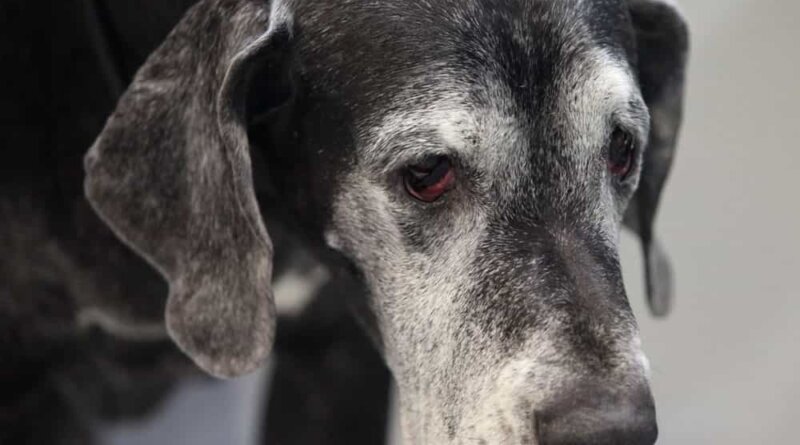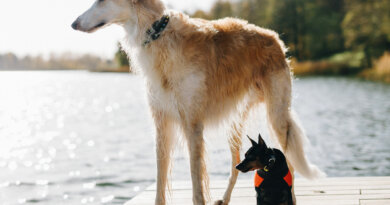How Long Do Great Danes Live? – Great Dane Life Span
[ad_1]
This post may contain affiliate links. We may earn money or products from the companies mentioned in this post.
The First time I saw a Great Dane, I was awed by this majestic breed and had to know everything about them.
One of the first things I learned is that the Great Dane life span is notably shorter than that of other dog breeds.
Saddened by this fact, I wanted to know why Great Danes have short life spans, and if there are any ways of prolonging their life expectancy.

While a Great Dane holds the record of the world’s tallest dog, this breed also has one of the shortest life spans in the canine world.
Although impressive, the breed’s colossal size is at the same time a curse, and the main reason why Great Danes don’t live very long.
You should know that Great Danes are also prone to an array of health problems that can significantly shorten their life spans.
Unfortunately, you can’t control your dog’s genetics, but there are a few things you can do to help your Great Dane live longer.
Below, you will learn about the typical life span of Great Danes and about the most common health problems that affect this breed. I will also share some tips to help you keep your Great Dane healthy and, in turn, increase his life expectancy.
How Long Do Great Danes Live?
For such huge dogs, you would think that Great Danes are blessed with long life spans. Unfortunately, that’s not the case! The average life span of a Great Dane is eight to ten years, but there are some cases of dogs living to the age of 12.
QUICK NOTE: We’ve noticed “in general” larger dogs have a shorter life expectancy than smaller dogs.
According to several scientific studies, Great Danes are one of the shortest-living dog breeds with a median life span of six years.
However, there are many stories about Great Danes reaching a ripe old age of 15 years, although there is little evidence to back up these claims.
While six years is rather short, you should know that Great Danes can live longer and reach old age. However, even if this happens, the fact still remains that Great Danes have a significantly shorter life expectancy than most other breeds.
Why Is The Great Dane Life Span So Short?
When compared to much smaller breeds, such as the Chihuahua, which on average lives from 12 to 20 years, a giant such as the Great Dane should live much longer. While this sounds like a plausible presumption, the reality is quite different.
In fact, this is a rather unusual case in the animal kingdom. In the wild, larger animals generally live significantly longer than their smaller counterparts.
For example, elephants can live for 70 years, while a much smaller brown rat has an average life span of only two years.
While scientists still don’t exactly know why things are different for dogs, they have a few theories. Not only do Great Danes have this problem; other large breeds such as the Irish wolfhound and Mastiff also have shorter life spans compared to other breeds.
One scientific study found that the Great Dane life span is directly linked with artificial selection.
Across generations, breeders crossed only the largest dogs to create even larger Great Danes.
However, the rapid growth that is common in giant breeds is also linked with serious health problems that shorten the overall life span of large dogs.
Another study concluded that larger dogs age much faster than their small counterparts. These new findings led scientists to conclude that this is the key factor that shortens the life span of giant breeds.
When taken into account together, these two factors seem like the most likely reasons why Great Danes have such short life spans.
However, these gentle giants are also predisposed to many health problems that can impact average life expectancy.
Great Dane Health Problems
Like all other dog breeds, Great Danes are prone to certain health conditions. The main problem here is that these health risks can shorten your dog’s life span and even be fatal.
Some of the issues that can shorten your Great Dane’s life span are:
Bloat
Great Danes are at a high risk of developing bloat. This is a very serious and potentially life-threatening condition that causes the stomach to twist in a way that cuts off the blood supply to the gut.
This is extremely painful for a dog, and if left untreated, can prove fatal.
Generally, dogs that have had bloat once are more likely to get it a second time. So, if your Great Dane develops this condition your veterinarian will likely recommend a tacking procedure.
The purpose of this surgery is to minimize future risks and prevent another gastric torsion.
Stomach tuck is often recommended for the prevention of bloat in Great Danes. During this surgery, a veterinarian will stitch your dog’s stomach permanently to abdominal walls, thus preventing the future likelihood of bloat.
If you own a Great Dane that’s prone to bloat, talk with your veterinarian and educate yourself about the causes and symptoms of this condition.
Remember, prevention and fast reaction are crucial and these efforts can save your dog’s life!
Joint And Bone Disease
Due to their giant size, Great Danes frequently suffer from joint and bone diseases such as arthritis and hip dysplasia.
Both of these conditions progress gradually and cause slow deterioration of the joint. Bone diseases are extremely painful and may force you to make some very tough decisions regarding your dog’s quality of life.
To prevent bone disorders, most large breeds, including Great Danes, should take joint supplements that contain glucosamine and chondroitin.
These substances help build and maintain cartilage, reduce pain, and increase mobility. If your Great Dane is already diagnosed with any form of bone disease, your veterinarian will probably recommend joint supplements as a part of therapy.
Since Great Danes often develop serious joint problems, most veterinarians recommend supplementation as soon as they stop growing.
And since joint pain is debilitating in so many ways, talk with your vet about giving your Great Dane joint supplements as a preventative.
Dilated Cardiomyopathy
Great Danes are one breed that frequently suffers from a heart condition called dilated cardiomyopathy. This condition causes the heart to become enlarged and affects its ability to pump blood.
Unfortunately, this is a progressive and incurable condition that will eventually lead to heart failure. In most cases, affected dogs don’t show any signs of heart problems until it’s too late.
Since the Great Dane is one of the breeds most commonly affected by this condition, you should research its symptoms and know what to expect. Keep in mind that at this time, there is no genetic test that can help detect affected Great Danes.
Hypothyroidism
Great Danes can also develop hypothyroidism. This disease occurs when the thyroid gland stops working properly and is unable to produce enough hormone called thyroxin.
The thyroid gland has an important role in metabolic rate regulation and it controls the growth and development of Great Danes.
Most Great Danes develop hypothyroidism between the ages of two and six. Affected dogs will start gaining weight without any visible change in their appetites or meal sizes.
Hypothyroidism is treated with synthetic hormones that should be administered throughout your dog’s life. And while it might seem like a hassle, this condition is easily managed with proper treatment.
How To Improve Your Great Dane’s Life Expectancy?
The average life span of a Great Dane is eight to 10 years, but you as an owner have a lot of say when it comes to the life of your dog. While you can’t change your dog’s genetics, there are many things you can control.
Exercise, proper diet, and regular veterinary checkups are a few things that can promote good health, and in turn, help your dog live longer. Here are a few things that you as an owner can do to increase your Great Dane’s life span:
Choose A Reputable Breeder
Buying your Great Dane puppy from a reputable breeder is a must if you want to see him grow old. A responsible breeder will provide health certificates for both parents and puppies that show that his lines are healthy.
You should look for a breeder that has dogs tested for genetic diseases such as hip dysplasia, eye problems, and heart disease. A Great Dane that doesn’t have genetic conditions is more likely to live longer than one that suffers from hereditary diseases.
On the other hand, if you decide to adopt a Great Dane from a rescue organization, you may not know much about your dog’s history.
However, you can always take your adoptee to a veterinarian for a full checkup and even do a screening for genetic conditions.
Feeding A Healthy Diet
Finding the best dog food for a Great Dane is another thing that you can do to maximize your dog’s life span. You should meet your dog’s nutritional needs throughout his entire life, but especially during puppyhood.
Being a giant breed, Great Dane puppies grow extremely fast. Like all other large breeds, your puppy will need special nutrition that will support proper growth and development.
A poor diet can lead to excess growth in giant breed dogs and result in musculoskeletal diseases such as hip dysplasia.
Feeding a balanced and healthy diet should remain your priority even when your Great Dane reaches adulthood and becomes a senior dog.
You should pay special attention to how much food your dog is eating to avoid weight gain. Obesity is a huge problem for many dogs and leads to an array of other health issues that can be problematic for your Great Dane.
Ensuring that your gentle giant is eating a breed- and age-appropriate dog food can go a long way in keeping him healthy. And at the same time, you’ll also improve your dog’s chances of reaching old age.
Disease Prevention
Great Danes are at risk of developing many different conditions, but certain preventative measures can significantly lower those risks.
For example, feeding several smaller meals throughout the day instead of one large meal can prevent bloat. A slow-feeding bowl can be a good investment since it reduces the chance of gas buildup in the stomach.
QUICK RECOMMENDATION: Stetson was a fast eater and we tried several slow feed dog bowls to keep him from gagging and vomiting. Our favorite was this slow feed bowl by Outward Hound.
In most cases, catching and diagnosing a health problem early on gives your dog a better chance at recovery.
Keeping up with regular veterinary checkups is a sure way to catch any health problems early on and start with treatment. Also, don’t forget to regularly take your Dane for vaccinations.
And while it might seem insignificant at the time, don’t hesitate to tell your vet about any changes in your dog’s behavior, eating habits, or activity levels.
All of these can be a sign of a disease that can put your dog’s well-being at risk if not diagnosed in a timely fashion.
Regular Physical Activity
Great Danes aren’t extremely energetic or active dogs, but they still need regular exercise to stay healthy and in good shape. You can make a schedule of physical activities for your Great Dane that involves daily walks and play sessions.
Since these dogs are prone to bone diseases, don’t push your Dane puppy to do any vigorous activities such as running or jumping.
Exercises like these can put an additional strain on your dog’s joints and exacerbate any existing conditions. Instead, stick with light and simple things such as a brisk walk or a game of tug-of-war.
FAQs About How Long Do Great Danes Live
Why Do Great Danes Have A Short Life Span?
Like all large and giant breeds, Great Danes are prone to several serious health conditions that affect their life span. Great Danes have a higher risk of developing bloat, dilated cardiomyopathy, and hip dysplasia, among other diseases.
And as if all of these conditions weren’t enough, scientists believe that larger dogs age much faster than smaller dogs. As a result, the average life span of a Great Dane is eight to 10 years.
What Do Great Danes Usually Die From?
Gastric torsion, also known as bloat, is the most fatal condition for Great Danes. Bloat causes a twisting of the stomach that cuts off the blood flow to the gut and heart, resulting in death. Sadly, this is just one of several conditions that plague this breed.
The second most common cause of death in Great Danes is heart failure caused by dilated cardiomyopathy. Most dogs with this condition don’t experience any symptoms of heart problems until it’s too late.
How Old Is The Oldest Living Great Dane?
Freddy, an eight-year-old Great Dane that lives in Weeting, Norfolk in the UK is the oldest Great Dane according to the Guinness World Records.
Interestingly, Freddy is also the tallest dog in the world, measuring 3 feet and 4.75 inches tall and weighing 196 pounds. When Freddy stands on his hind legs, he is taller than most basketball players, measuring 7 feet and 5.5 inches tall.
How Do You Know If Your Great Dane Is Dying?
As a dog owner, you will be the first one to notice if your Great Dane is acting out of the ordinary. Keep in mind that all dogs act differently when it’s their time to go. But most dogs exhibit a set of behaviors that can give you an indication that the end is near.
Reduced mobility, decreased thirst, labored breathing, evident pain, and incontinence are imminent signs that your Great Dane is dying.
If your dog is exhibiting any of these signs, you should consider calling your vet to provide hospice care or humane euthanasia at home.
Do Female Great Danes Live Longer Than Males?
Female Great Danes generally live longer than males, especially if they are spayed. There is no exact way of knowing why females live longer.
However, female Great Danes are smaller than males, so their smaller size might be one of the factors that increase their life span.
Conclusion
A well-bred Great Dane can be one of the sweetest and most affectionate dogs you will ever own.
Unfortunately, due to their giant size and many health problems, Great Danes have a shorter life span than most dog breeds. Still, there are things you as an owner can do to help your Great Dane reach old age:
- Get your puppy from a reputable breeder.
- Feed a complete and balanced diet throughout your dog’s life.
- Take your Great Dane to regular veterinary checkups.
While they have short life spans, Great Danes can reach a ripe old age and be amazing companions when properly cared for.
Do you have a Great Dane?
If so, how old is your gentle giant?
Tell us about your dog in the comment section below.
Save To Pinterest

Top Picks For Our Puppies
- BEST PUPPY TOY
We Like: Snuggle Puppy w/ Heart Beat & Heat Pack – Perfect for new puppies. We get all of our Service Dog pups a Snuggle Puppy. - BEST DOG CHEW
We Like: Best Bully Sticks – All of our puppies love to bite, nip, and chew. We love using Bully Sticks to help divert these unwanted behaviors. - BEST DOG TREATS
We Like: Wellness Soft Puppy Bites – One of our favorite treats for training our service dog puppies. - BEST FRESH DOG FOOD
We Like: The Farmer’s Dog – A couple months ago we started feeding Raven fresh dog food and she loves it! Get 50% off your first order of The Farmer’s Dog.
Check out more of our favorites on our New Puppy Checklist.
[ad_2]
Source link





It’s in point of fact a nice and helpful piece of information. I’m glad that you simply shared this useful information with us. Please keep us informed like this. Thank you for sharing.
What Is Sugar Defender? Sugar Defender is made of natural plant-based ingredients and minerals that support healthy blood sugar levels.
I appreciate, cause I found exactly what I was looking for. You’ve ended my four day long hunt! God Bless you man. Have a nice day. Bye
Wonderful blog! Do you have any recommendations for aspiring writers? I’m hoping to start my own website soon but I’m a little lost on everything. Would you recommend starting with a free platform like WordPress or go for a paid option? There are so many options out there that I’m completely overwhelmed .. Any tips? Many thanks!